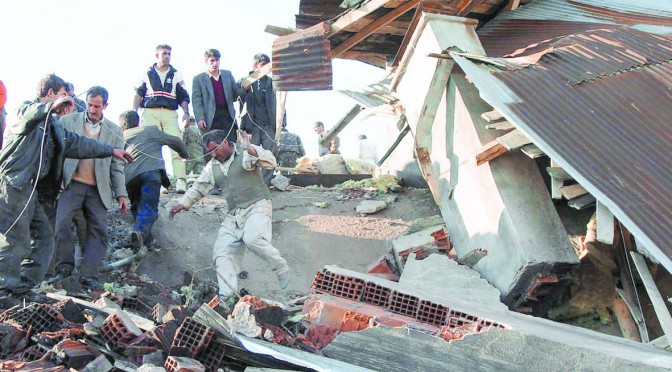In the last decade, researchers in the fields of neuroscience and epigenetics have made exciting advances toward decoding how our way of thinking can actually change our bodies. Research has revealed that the thoughts we think have the power to make us sick or keep us well, and can even impact the expression of our genes. Our very brain chemistry and the actual structure of our neural pathways are influenced by mood and stress, both of which are reflections of how we interpret what goes on in our lives.
Tamara Brennan, PhD, is a mom, psychologist and writer living in the borderlands of Mexico and Guatemala. She is the Executive Director of the Sexto Sol Center for Community Action and the creator of the Our Cozy Time Story Club, featuring her original stories for children, where she blogs about Attachment Parenting.
She has written several articles for Attachment Parenting International, including “Protecting Children From Our Pain About the World,” “Helping My Young Child Adjust to a Change of Caregivers” and “The Parade of Little Girls,” which details the heartbreak when a child’s playmate no longer wants to be friends.
We now know that early childhood impressions play an important role in how the nervous system develops. In general, chronic fear, worry and stress can change brain structures and even create a predisposition for specific chemical responses that affect a whole gamut of physiologic processes. What is profoundly significant is that these chemical responses ultimately have the power to set a person up for a certain feeling state that will be their set point — their baseline mood — for the rest of their life.
So, when a child grows with the experience of being secure in a safe world, they develop a brain and chemistry that support a happier feeling state from which to create their lives. On the other hand, exposure to violence in childhood does the opposite. In the extreme, prison populations are made up of a high number of individuals who were exposed to an inordinate level of violence as children. So it’s not just a lack of morality or conditioning that leads to anti-social behavior — it has a physical origin as well, due to the changes that long-term stress causes in the nervous system.
There is an aspect of a child’s developing brain that can give us another reason to keep the filter of protection around our precious children. It has to do with the measurable frequencies of electrical impulse that the brain puts out. Different frequencies correspond to different levels of awareness.
Until around the age of 7, a child’s brain functions predominantly in the theta wave range. When a person is in the theta level of brain activity, they experience a state of consciousness that serious meditators achieve after years of dedicated practice. We go into theta during REM sleep when we are actively dreaming. A person deprived of REM sleep for a few days can suffer from serious psychological consequences simply from not being renewed when the brain enters the theta state.
Theta is the brain state in which a person can access their highest aspirations and creative inspiration. Our children live in that state much more of the time when they are small, as compared to adults. It is later in a child’s development that the alpha and beta states start to replace the magical, rarified vibration of theta in the brain activity.
In alpha and beta, our awareness is ruled by the chatter of the mind — which gets its information from the warehouse of the subconscious where all our traumas and painful experiences are stored. Have you noticed how often the mind’s messages are not exactly soothing or even kind? For a lot of us as adults, there comes a moment when we realize that if we want to be truly happy, we have to do something to end the background noise of our worried and stressed out minds. We can spend the rest of our lives longing for the so-called innocence of childhood, since childhood was that time when we could be still, and instead of feeling apprehension, we felt joy.
Again, there are always well-meaning people who will say that kids need to know the “truth” about the world. They think it’s in the kid’s interest to snap out of the dreaminess of childhood and get the alpha-beta overlord set up on his throne. But do we really do a child any good to tell them, for example, that the world is heating up so much that it may not survive? It is their generation that is going to have to come up with the solutions. Wouldn’t it be better for us to help them maintain continued access to their higher brain functioning where their wiser visions are informed by the soul rather, than having them develop into people whose impulse to take action is limited by a mind full of reasons to be afraid?
We instinctively protect our children from physical danger, so it follows that we would want to protect them from mental danger as well. This means preventing — as best we can — descriptions and images of violence, cruelty or disaster from intruding into the safe haven of our homes. We can decide what things are discussed in the presence of our kids. We can turn off the electronically generated noise when it’s not what we want them to hear.
There is a whole discussion we could have about the impact of too much negative information coming at us from all directions. What was considered indecent when I was a kid is now put out there in all its graphic detail on the television, in movies and the print and social media. There is a cost to this continual exposure to injustice and disaster to us, not just to our children.
But even though this kind of callous noise surrounds us in pixels and bytes, it is up to us to be the champions for the happy childhood that our children deserve. When the proverbial window bursts open to the howling winds outside, we run to close it shut. We reassure them that they are safe until the thunder dies down. What I am suggesting is that we extend this natural reflex to include keeping the brutal face of the world out of the window, as well.
We can trust our innate knowing if we will remember to look deeper.
What do we do when our children are exposed to the “bad stuff” that happens? Fortunately, by design, we have an excellent tool already on hand for helping our children. It is our intuition. When we remember to pay attention to it, intuition will remind us at warp speed what it felt like to be a little person confronted with scary, confusing information. It will clue us in to the fears that our child might not be able to express. It’s a good skill to practice — that of looking deeply at our children until we can understand how things feel to them. Doing so keeps the focus off our own reactions, and on their emotional needs — something that is important when they are looking to us for signs of whether it is safe to stop being scared.
Young children feel their way to new understanding. It will help us guide them there if we can remember in that split second before we speak, that their software is still being installed. Instead of offering detailed explanations or political analysis in the attempt to help them comprehend troubling information, we do better to speak to their feelings and lead them home from the darkening wood. It is a matter of respect.
An Example of What a Child Hears
You know this saying since it’s pretty much a parenting cliché used to cajole children to eat their vegetables: “There are starving children in Africa. You should be grateful that you have this food to eat.”
I have never understood the logic that leads people to believe that mentioning such tragic information could motivate anyone to eat, let alone to develop a sudden appreciation for asparagus or rhubarb. If there are hungry children then there is a serious situation that should be fixed, right? How could begrudgingly eating the last bites alleviate trouble of that magnitude?
The statement is meant to imply that the kids who are refusing the last bit of zucchini casserole are supposed to feel lucky. But if aside the frustration of the dinner table, we are trying to raise compassionate human beings, it is not the best tactic to suggest to them that they be relieved that misfortune happens to other people.
Do we want their awareness to stop at feeling happy that they got skipped over when calamity was being dished out? Are we suggesting that the suffering of those other children is not important? Or is it possible that they might interpret it that we want them to be afraid that if they forget to eat, they will starve like the African children who can’t eat? It is a confusing piece of information at the best.
Let me share my own experience at 3 years old when I first heard about the frightening situation faced by those hungry kids. It was a dinner guest who broke the news about their situation and told me that they lived in Africa. And though I searched the faces of my parents, no further details were offered. I froze in my chair, feet dangling above the floor. My mind raced to imagine children, maybe as many as 10, who were without food in a place that was probably so far away that it was beyond the city where my grandma lived!
How did it happen that they had no food in their house? Where were their parents? Were they going to die? It was very upsetting to consider their plight, the circumstances of which were beyond my ability to imagine.
I did not feel like eating.
I can still remember the sense of urgency I felt the next morning as I stood in my pajamas at our cupboard, searching for relief supplies. I took the bag of my favorite cookies over to my mom who was cooking breakfast. “We have to take these to them, the children.”
What my mother did next was inspired by pure mothering genius, and I will always be grateful to her for her insight. She looked at me, understood, and said, “Okay, good idea.”
We got into the family station wagon, the humanitarian aid cookies on my lap, and drove to our church. We found Father John who was wearing his priest-collar, so I knew he was still on the job even though it was not Sunday.
My mom explained to him on my behalf that we needed his help to get the cookies to the children who were starving in Africa. I searched his face to see if I could trust him with this urgent mission. Without missing a beat, he said that he would do that right away.
“Please, it’s very important,” I told him. I handed the bag of cookies up to him. We got in the car as he pointed to the cookies and waved goodbye. We drove back to our house in silence passing through neighborhoods of children on bikes who seemed to my searching eyes to be well-enough fed.



I would love to hear more about how to talk to children about tragic world events. My husband is in the army and we are moving to a volatile country in a few months with a 3 yr old and 1 yr old. How do I explain our emergency evacuation plans and what daddy does on the other side if the country? Any help would be appreciated!
Hello Kate, I’m the author of this article. You might like to read my related article published in an earlier issue of this magazine. With very little ones, the most important thing in my view is to allow them to feel safe. Safe needs to be their normal emotional state. That will help them to develop a healthy attachment to you and your husband which is the basis of emotional health. They are too young to understand complex things like why you will be there, or what daddy is doing. Small ones live in the moment so talking about potential troubles is not helpful, if it can be avoided. The answer to “is it going to be OK?,” is “yes.” So I suggest that you focus on creating a safe “container” for them at all times while keeping in mind that they are tiny/young and emotionally tender. If that means something like sitting in an unfamiliar airport for example, you can wrap them up with you in the trusty blankie to delineate your family’s safe haven. That would communicate that you are a reliable family unit even in a strange situation. Physical closeness and things like humming a calming tune help allay fears. I’d also suggest that you find a practice you can use to manage your own stress and uncertainty so you can be authentic with them in difficult moments. I hope there will be very few of those moments. As a rule, us mamas can trust our hearts to know what our babies need. The head is sometimes not as helpful. Wishing you and your family well.